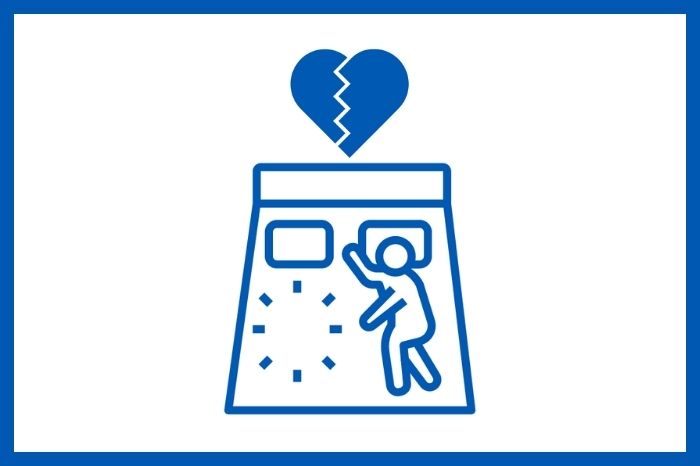Men when they break up - The male mind in the midst of a breakup
One of the top questions guys ask after a relationship ends is: How do men deal with a breakup? This makes sense when you consider that most of us don't like to talk about our feelings.

Contrary to what is portrayed in popular culture, most men don't use booze to deal with a breakup.
That said, many find themselves entering new relationships, sometimes just weeks after the breakup. Others develop a voracious sexual appetite, using physical contact as an emotional distraction.
You may have heard something along the lines of "When a man ends a relationship, he moves on to the next girl. On the other hand, women suffer and are alone longer."
Or "Men get over breakups faster" and "It's easy for them to break up because they don't get emotional."
I'm sure you've heard variations of these phrases. Part of this is true. Others not so much. Let's understand better below.
Regardless of what you might read elsewhere, know that breakups are hard for men too. Just like anyone else, they have emotions. Although you may never see it, some even cry - that man doesn't cry story doesn't fit here.
The difference between how men and women deal with a breakup is that after things are over, men tend to hide their feelings from the world.
The greater the attachment to a romantic interest, the more irrationally they (initially) act toward an ex-partner (Mosher & Tompkins, 2010).
I'm not saying this is true for all men. After all, we are not a monolithic group. But it is a behavior exhibited by many as a means of coping with emotional pain.
You might be wondering why?
It's simple - men need to seem immune to pain because that's how they're taught to react. Much of this is tied to typical alpha male traits and the need to always appear in control.
All of this leads us to the 10 most common strategic approaches men take as part of relational disconnection, that is, when they go through the process of ending a relationship, regardless of who did the ending.
All this is just for you to understand the male mind a little more.
1. Avoiding contact: Research has found that decreasing contact is men's preferred method after a breakup (Baxter, 1982).
They often employ this tactic when intimacy with a partner was low and there is little likelihood of maintaining a friendship after a breakup.
2. Distortion of the Truth: Some men engage in various forms of distortion as a post-breakup strategy. Examples include telling friends, "I'm fine" or "I never really liked her."
The goal is to reinforce the inner message of being unattainable, even if he is suffering.
3. Withdrawal of Support: Yet another way men deal with breakups is to slowly cut off emotional support. Here, the man will be less available to talk, discuss problems and offer any comfort to his ex.
In this way, the man is telling an ex (indirectly) that he values her less. This is a conscious choice on his part and is designed to act as an emotional shield.
4. Take a permanent break: In many ways, this is a cruel strategy used by some men. Here, the guy might say something like, "Maybe we should take a break, give each other space."
When you translate that into masculine language, it's almost a surefire bet that he's canceling things. Plus, it's his way of lessening your emotional pain.
5. Act like an idiot: By employing this tactic, the man will become deliberately obnoxious, rude, argumentative, and downright obnoxious. Behaviors are designed to send the message, "You hurt me, now I'm going to hurt you."
The more intense this behavior, the greater a man's pain level. In many ways, this paradoxical approach makes you feel worse because of intense feelings of guilt.
The only exception to this would be if the guy is a narcissist or sociopath.
6. Direct Termination: This is exactly what it sounds like; a sudden end to the romance. The decision is announced arbitrarily by the man and can happen face to face, by text message or email.
Men who take this approach are usually very direct and channel alpha traits.
7. Dating other people: One approach some guys use is to suggest that both parties in the relationship date other people. A typical comment might be, "Maybe you should try dating another guy."
Here, the man is trying to bring about a separation. This is a way of saying that he is going to look elsewhere and that the woman should do the same.
8. Justification: In relationships with guys that require a high degree of autonomy, we often see the justification strategy employed to end a relationship.
Example: "We're becoming too dependent on each other and that's not healthy."
This method used when a guy is not ready to settle down or has problems with commitment.
9. Blame Game: When cycles of negativity become a pattern, men will sometimes seek out the blame game approach. This one is more used than you might think.
An example might be a couple who start talking about their problems. Unable to take responsibility (or unwilling to take responsibility), the man will blame everything on his partner in order to make things end.
10. Negotiated Goodbye: One way for a man to end a relationship with a partner is through negotiations. This approach is ideal because it gives both parties a chance for supportive communication.
Unfortunately, it's not used often by men because to do that, they need to be emotionally vulnerable. When this happens, it usually happens in long-term relationships.
Also, men negotiate when both parties know things are over a long time ago, but no one wants to admit it.
The man after he ends a relationship
Usually all men do post-breakup is try to avoid the "drama". When you decode this into masculine language, it means, "I don't want it to become emotional."
As a result, some choose to cut off all contact with their ex. This is an offshoot of the contact avoidance approach mentioned earlier (Vilhauer, 2015).
A lot of men act like their ex doesn't exist for them. This is a strategy used, mainly to avoid answering the ex-partner's calls.
When men do this, they purposely don't want to signal any emotional reaction to the breakup. And if they happen to talk again, conversations are boring, monotonous, and devoid of feeling.
Have you ever noticed that many men immediately get attached to someone else right after they break up?
It is important to state that men are not the only ones who do this. Women can also immediately get involved with someone right after a breakup.
But for men this is much more common.
Usually referred to as the "step" person, the woman the man has recently become attached to acts as a temporary distraction.
Unfortunately for the woman who is with this man, the relationship is doomed from the start. That's because, sooner or later, the man will end up realizing that the benefits of the new relationship are short-lived.
This is because, over time, the unresolved feelings that the man harbors from the previous relationship begin to surface.
In this way, men are really at a disadvantage when thinking long term, as it is much wiser to deal with their feelings here and now than to pretend to be just fine.
On the other hand, women are much better equipped to work emotionally and process feelings of loss so their next relationship isn't burdened with previous baggage.
A lot of men rely on the idea of going around "making it big" after a breakup. This is not a bad approach at all. In fact, there may be some restorative benefits to this era of casual sex.
Importantly, men are programmed to seek physical contact. And I'm not just saying this to offer guys permission to do so.
But this behavior becomes unhealthy when it is used as a bandage to inadequately treat long-standing emotional pain. Ultimately, unresolved feelings need to be addressed if the man is to enter a stronger (and wiser) future relationship.
Over time, men eventually reach a point of self-assessment and come to understand that superficial and only physical connections with other people don't really fix what ails them.
For this to happen, man must be willing to look at himself through the lens of self-compassion and self-evaluate.
Finally, know that when men break up they feel real pain.
According to at least one study conducted by Binghamton University, men often never "get over" a breakup. Instead, they simply adapt to the new reality (Stauffenberg, 2015).
Conclusion
I hope you found the material shared in this post helpful. If you're a male reader, you now have new insight into how some men deal with the end of a relationship.
And if you're a guy's ex-girlfriend, much of what's been presented here probably serves as confirmation for things you've long suspected.
References:
- Baxter, Leslie A. "Strategies for ending relationships: Two studies." Western Journal of Communication (includes Communication Reports) 46.3 (1982): 223-241.
- Mosher, Donald L., and Silvan S. Tomkins. "Scripting the macho man: Hypermasculine socialization and enculturation." Journal of Sex Research 25.1 (1988): 60-84.
- Stauffenberg, J. (2015, 11 Aug). Men can never really get over a relationship, the study says. Retrieved from https://www.independent.co.uk/life-style/love-sex/men-may-never-truly-get-over-a-relationship-breakup-says-study-10450413.html



















